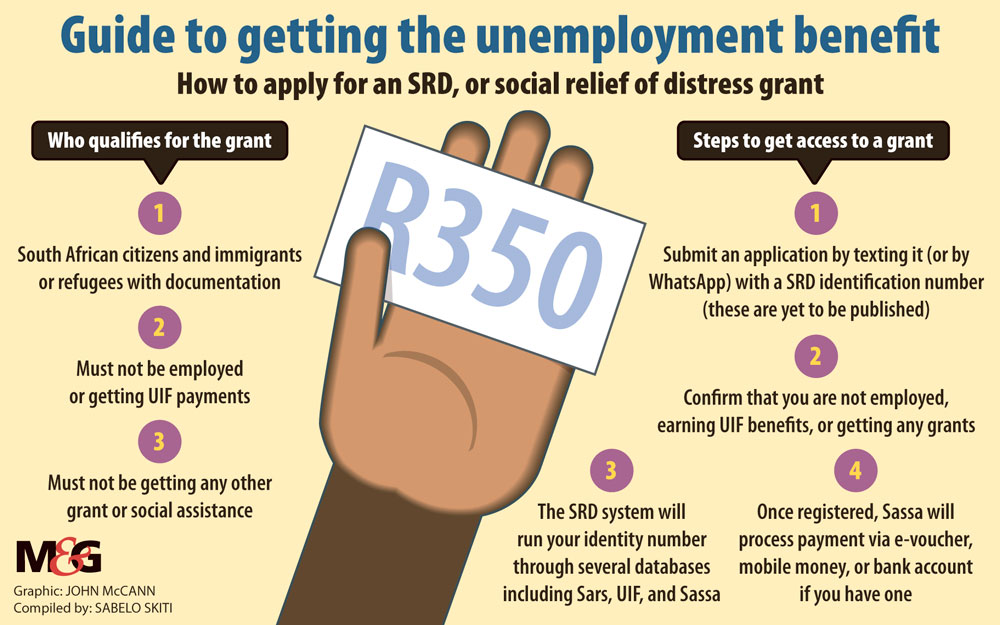Helping hands: A pensioner is given assistance to collect her South African Social Security Agency grant payment at a government paypoint. (Roger Sedres)
As the government gears up to provide its social services digitally to comply with state of disaster regulations, it has been warned that not all poor South Africans have access to technology.
After President Cyril Ramaphosa’s announcement that government would inject R50-billion into relief, which will include a new R350 monthly stipend for unemployed, poor and indigent people, the chief executive of the South African Social Security Agency (Sassa), Busisiwe Memela, detailed an ambitious programme, which would see people register for the new Covid-19 relief grant using technology.
Memela, speaking on CapeTalk radio station last Friday morning, said Sassa would conduct final testing on the system — which will allow people to register through an SMS or WhatsApp — over the weekend and roll it out this week.
“We’ve been working for the past two weeks on building a front-end system so that the process is automated. We recognise the fact that it we wait for people to call it becomes even harder.
“They are going to be using a USSD [SMS] or WhatsApp process to register,” she said.
Memela also said people would simply need to identify themselves and not require other paperwork, as Sassa would, for the first time, make use of databases belonging to the South African Revenue Service, the Unemployment Insurance Fund, and the National Student Financial Aid Scheme to verify whether applicants qualify. Sassa would also run all names through its own databases to confirm that applicants are not receiving other grants.
“We will also work with civil society in terms of working with NGOs [nongovernmental organisations] in different communities, so that they can provide support and assist people that may not have access to a phone,” Memela said.
Payment will be through three avenues: An e-voucher, mobile money, or electronic deposit into the beneficiary’s bank account.
But not everyone was excited about the technological innovations, with nonprofit organisation Black Sash urging the government to consider people — particularly those in the rural areas — who do not have access to technology.
Black Sash director Lynette Maart said that Sassa’s call centre — the only way to access Sassa services currently, because local offices have been closed since the lockdown began — has not been coping with the volume of calls.
“Sassa and government departments delivering social-security services must urgently open up their offices to respond to the social and economic relief measures as announced by President Cyril Ramaphosa,” she said.
“We urge Sassa to develop application systems that are mindful of potential beneficiaries, especially those in some rural areas, who are without information and communication technologies, and may not have airtime and data to apply for the Covid-19 social relief of distress grant using online platforms.”
Maart continued: “The Black Sash fielded complaints from the general public, who have tried, without success, to contact the call centre.”
“Furthermore, existing grant beneficiaries whose grants have been suspended for one reason or another have no recourse to having their grants reinstated,” she said.
Sassa spokesperson Kgomoco Diseko this week said that from May 1 Sassa would begin the gradual process of opening local offices to alleviate pressure on the call centre — which has been receiving about 40000 calls a day since lockdown began — as well as regional offices, which have been open for admin processes.
“The demand is far greater than a full staff complement, but it’s important to understand the need for a change in behaviour and following the law, given the serious threat the country is facing,” he said.
Sassa’s annual financial report for the year ending in 2019 shows it paid out R162-billion to 17.8-million South Africans in need of social assistance.
This comprises R60.6-billion (R445 a person a month) in child-support grants, R22-billion (R1860 a person a month) to individuals who cannot work as a result of living with a disability, R5.1-billion (R1080 a person) in foster-care grants, and about R75-billion to pensioners, war veterans and children living with a disability.
The agency also distributed R546-million in social relief of distress grants, which included food parcels, school uniforms, vouchers and cash to beneficiaries across the country.
Extra relief announced by Ramaphosa last week takes the form of six-month increases of R250 a month for six of the seven grant types. The seventh, the child-support grant, will increase by R300 a child for the month of May, and then R500 a parent or caregiver for six months from June.
 (John McCann/M&G)
(John McCann/M&G)
The special R350 social relief of distress grant will be paid to people who are unemployed and not receiving any other form of government grant.
Maart described the R350 as “highly inadequate” to cover food, energy, transport and materials needed for cleaning regimens. “It is considerably less than the food poverty line of R581 per person per month and cannot provide even basic nutrition for one person,” she said.
“The amount of R350 is also significantly less than the value of the social relief of distress food parcel of R1200 per month distributed by Sassa. We recommend that the government use the upper-bound poverty line of R1227 as the baseline.”
Diseko referred questions about whether the interventions were adequate to the treasury. “Internal discussions are taking place about the manner but in principle offices will reopen in phases to ensure adherence to social distancing and related requirements of this lockdown. The process of sanitising offices has already begun,” he said.